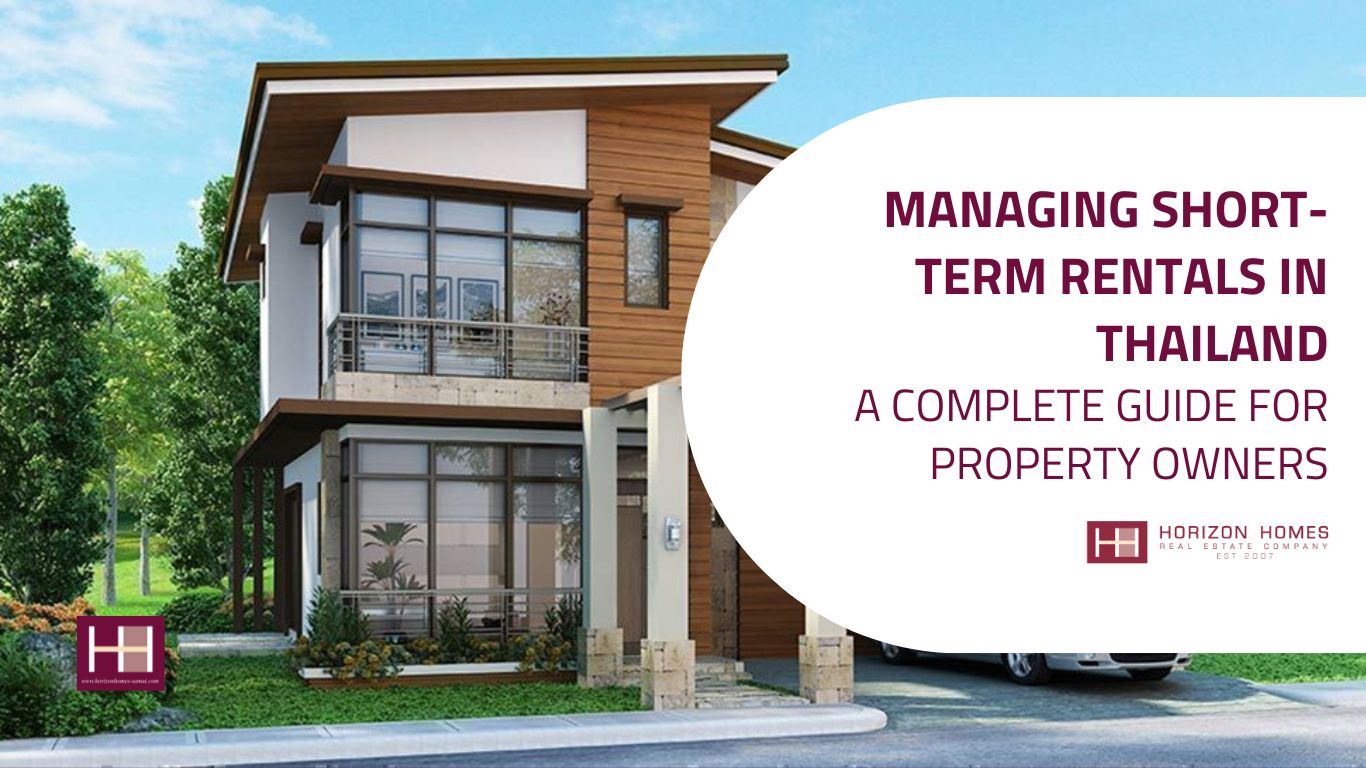Thailand, one of the world’s top tourist destinations, presents lucrative opportunities for property owners looking to enter the short-term rental market. From bustling cities like Bangkok to beach getaways like Phuket, short-term rentals can generate impressive returns if managed effectively. Imagine turning your property into a steady income source while providing travelers with memorable stays.
This guide covers essential strategies for property owners to maximize rental income, navigate legal complexities, and deliver exceptional guest experiences in Thailand’s thriving rental market.
What Are Short-Term Rentals?
Short-term rentals are properties rented out to guests for brief periods, typically anywhere from a single night up to a few weeks, as opposed to traditional long-term leases. This rental model appeals to travelers looking for a more personal, flexible, and often cost-effective lodging option than hotels. Short-term rentals are popular on platforms like Airbnb, Vrbo, and Booking.com, and they allow property owners to take advantage of tourism-driven demand while maintaining flexibility to use their properties personally when they wish.
Short-term rentals in Thailand are particularly profitable in high-demand areas, where owners can set nightly rates that vary based on tourist seasons and demand, maximizing revenue. However, successfully managing these rentals requires understanding local regulations, ensuring a great guest experience, and applying strategic pricing.
Why Short-Term Rentals in Thailand Are a Great Investment
The demand for short-term rentals has soared across Thailand, especially in popular tourist areas such as Phuket, Bangkok, and Chiang Mai. A typical short-term rental in Phuket, for example, achieves an occupancy rate of 66% and an annual revenue of approximately THB 558,000. This highlights the income potential for property owners who effectively manage their rentals in high-demand regions.
Key Benefits of Short-Term Rentals
- Higher Income Potential: Compared to long-term rentals, short-term rentals offer higher nightly rates.
- Flexibility for Owners: You can use the property for personal stays when it’s unoccupied.
- Diverse Guest Base: Hosting guests from various parts of the world fosters cross-cultural interactions.
Key Strategies for Managing Short-Term Rentals in Thailand
1. Navigating Local Regulations and Legal Requirements
Understanding Thai regulations is crucial to running a compliant short-term rental business.
Compliance with Thai Laws
- Hotel Licensing: Short-term rentals of fewer than 30 days typically require a hotel license under the Thai Hotel Act, with some exceptions. Non-compliance could lead to fines.
- Zoning Restrictions: Some areas have zoning laws prohibiting short-term rentals. Research these local ordinances to avoid legal issues.
- Reporting Requirements: All hosts must report foreign guest information to immigration authorities via the TM30 regulation.
2. Leveraging Professional Property Management Services
Hiring a property management company can streamline operations and improve guest satisfaction. Many management firms in Thailand offer full-service solutions, ensuring a seamless experience for property owners and guests alike.
Comprehensive Management Solutions
- 24/7 Guest Support: Professional managers handle guest inquiries and issues, enhancing the guest experience.
- Listing Optimization and Marketing: Managers maximize visibility on platforms like Airbnb, boosting bookings.
- Cleaning and Maintenance: Regular upkeep keeps your property in top condition, increasing positive reviews and repeat bookings.
3. Utilizing Technology for Efficiency
Integrating technology simplifies management and enhances guest satisfaction.
Smart Home Devices
- Keyless Entry Systems: Smart locks streamline check-ins and check-outs, providing guests with secure, hassle-free access.
- Automated Messaging Systems: Use automation tools to send guests booking confirmations, check-in instructions, and local recommendations.
Building a Memorable Guest Experience
Creating an unforgettable stay for guests is key to standing out in Thailand’s competitive rental market.
Personalized Touches
- Welcome Gifts and Personalized Notes: Small gestures like welcome baskets or handwritten notes help create a memorable first impression.
- Local Guides: Provide curated guides with recommendations for local dining, attractions, and activities, adding value to your guests’ stay.
Risk Management and Safety
Protecting your property and guests is essential.
- Short-Term Rental Insurance: Specialized insurance covers damage and liability issues specific to short-term rentals.
- Safety Features: Equip your property with smoke detectors, carbon monoxide alarms, and a basic first aid kit to ensure guest safety.
Practical Examples of Successful Management
Case Study: BnBCondo in Bangkok
BnBCondo is a property management service in Thailand known for its strategic approach to short-term rentals. By focusing on optimized marketing, 24/7 customer support, and excellent property upkeep, they have achieved an average occupancy rate of 75% across over 1,000 managed properties. This case demonstrates the importance of strategic marketing and high-quality service for success.
Real-World Application: Chiang Mai Rental Transformation
A Chiang Mai property owner partnered with a local property manager to enhance their listing and increase occupancy. Within six months, their occupancy rose from 50% to 80%, attributed to optimized listings, targeted marketing, and a strong focus on guest satisfaction.
Actionable Tips for Property Owners
- Research Local Regulations: Stay informed on regulations and licensing to ensure compliance.
- Choose a Reliable Management Partner: Select a property management company with a proven track record and positive client reviews.
- Invest in Quality Photography: High-quality photos make a strong first impression, improving booking rates.
- Encourage Guest Reviews: Positive reviews boost your property’s credibility and search ranking. Follow up with guests post-stay to ask for feedback.
Properties for sale
Conclusion
Managing short-term rentals in Thailand can be an immensely rewarding venture. By adhering to local regulations, enlisting professional property management services, and leveraging technology, property owners can unlock significant income potential while providing exceptional guest experiences.
Whether you’re managing rentals in Phuket, Chiang Mai, or Bangkok, these strategies will help you maximize returns and minimize hassles. Check out our guide about property management if you want to learn more.
FAQs About Managing Short-Term Rentals in Thailand
Yes, properties in high-demand areas like Phuket and Bangkok often see substantial returns, with typical revenues around THB 558,000 annually.
Yes, but you must adhere to local laws, including licensing and reporting requirements.
Seek firms with strong client reviews, comprehensive service packages, and experience managing short-term rentals in Thailand.
Optimize your listing with high-quality photos, responsive guest communication, and unique amenities like local guide recommendations.
Yes, property management software, smart locks, and automated messaging tools can significantly streamline management.






